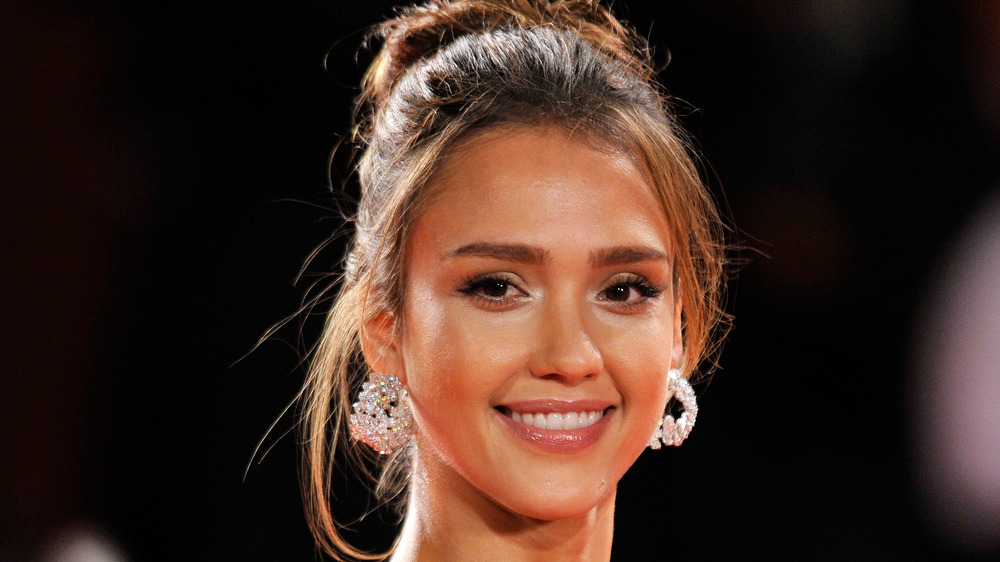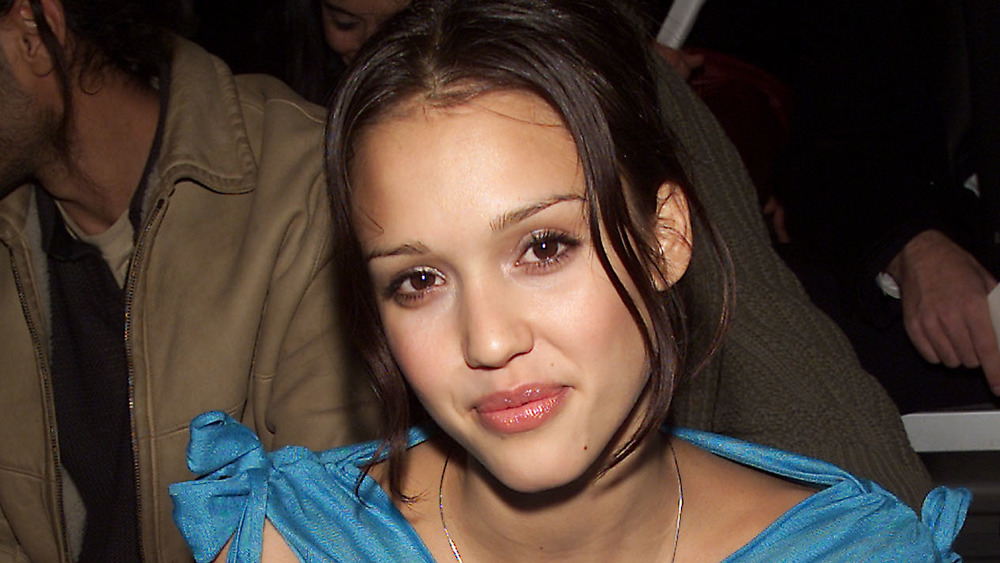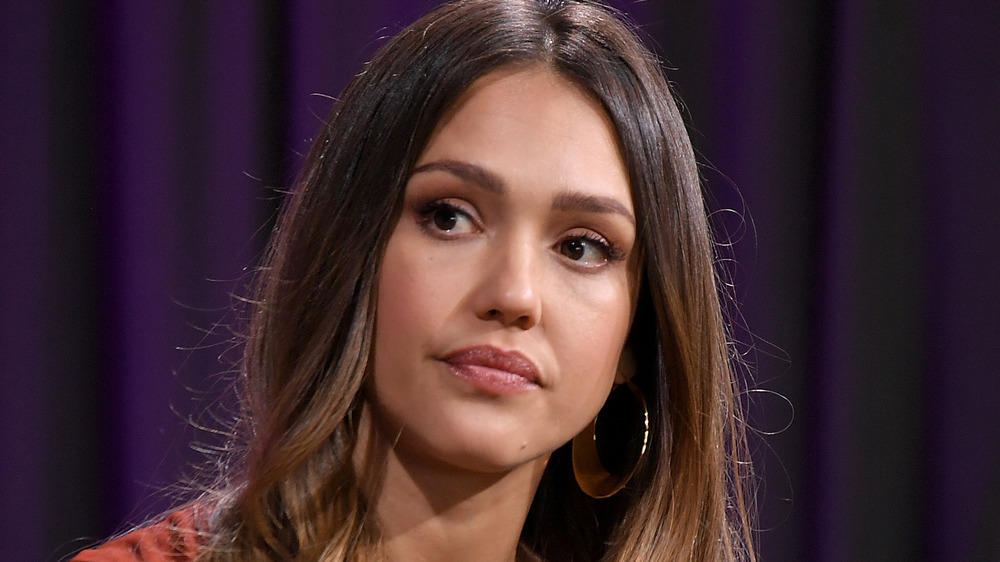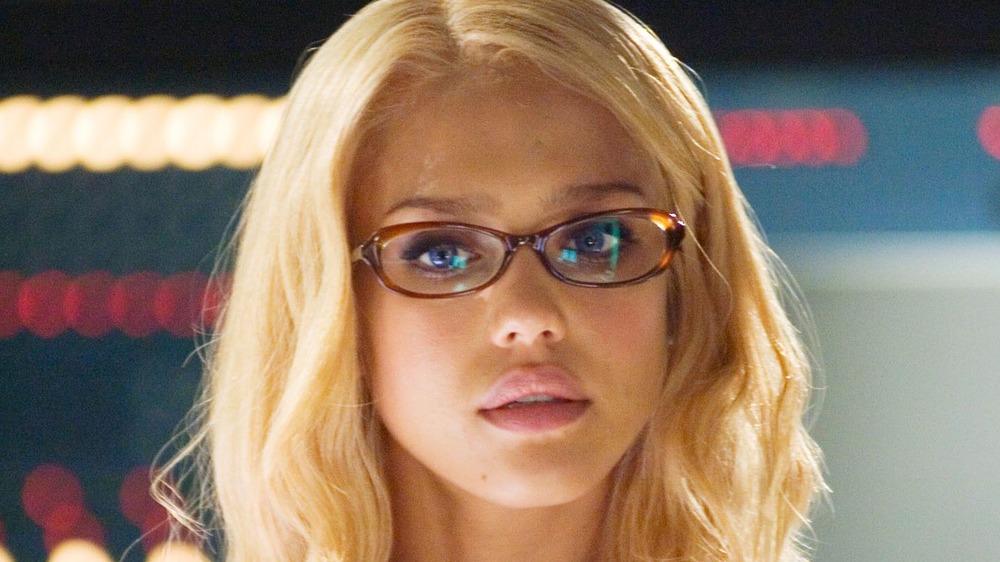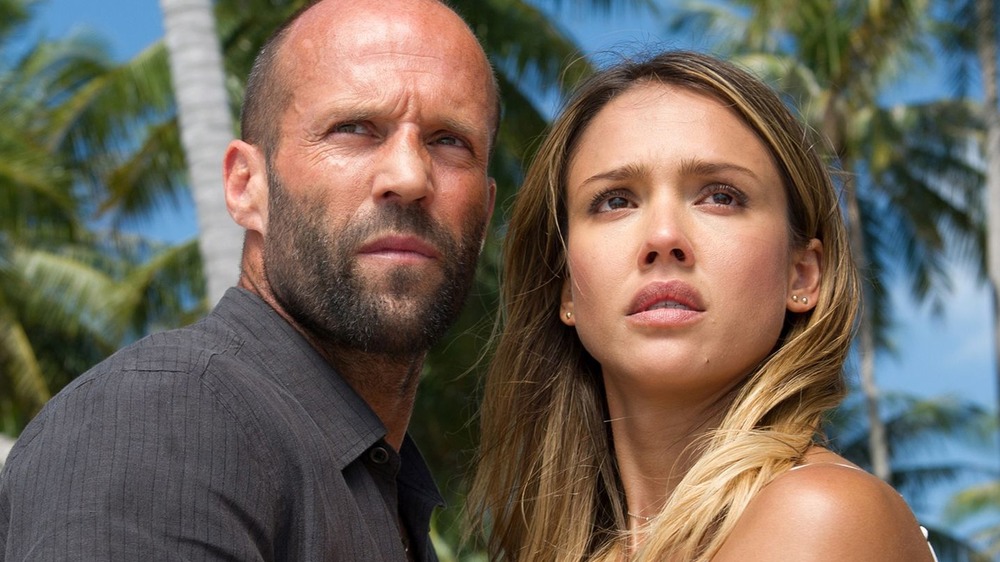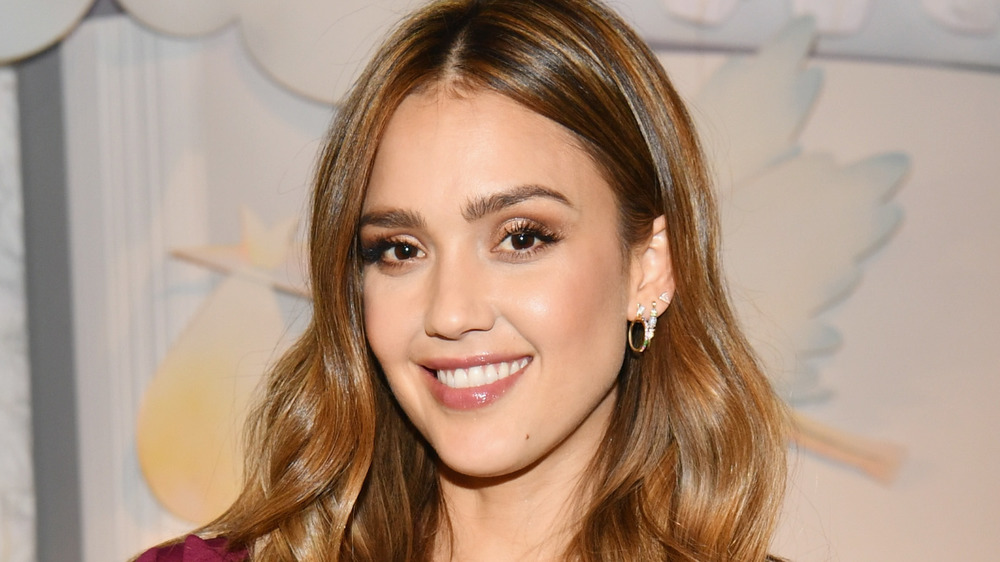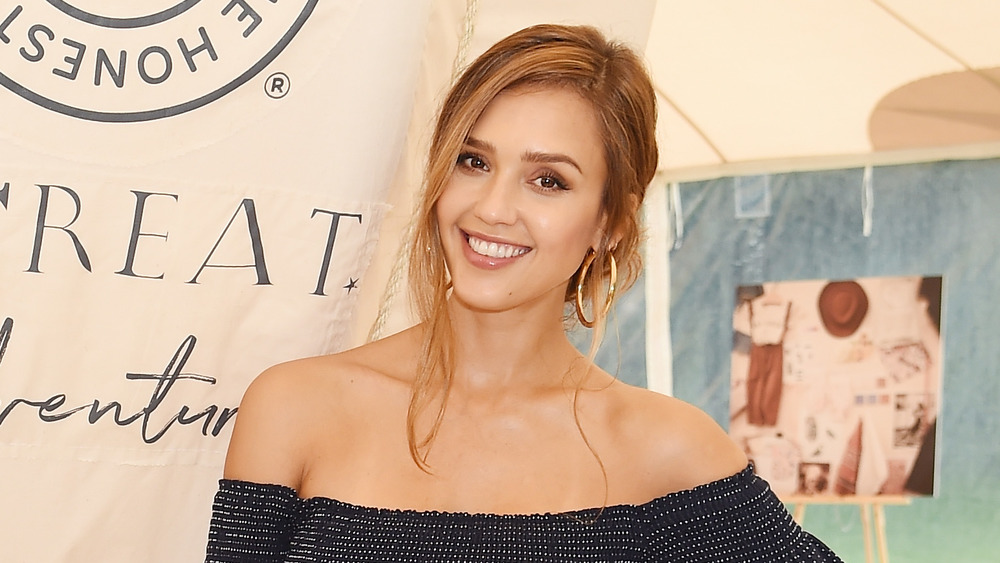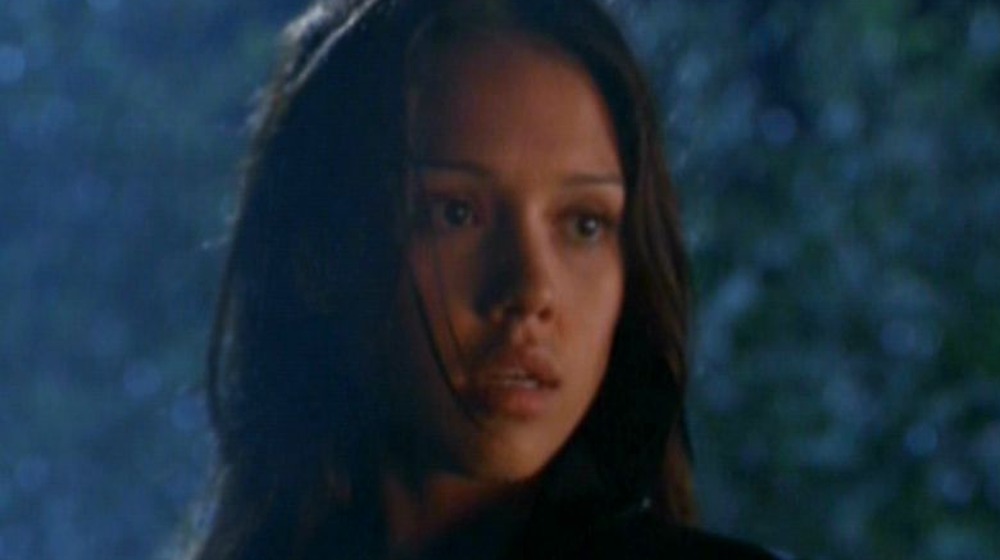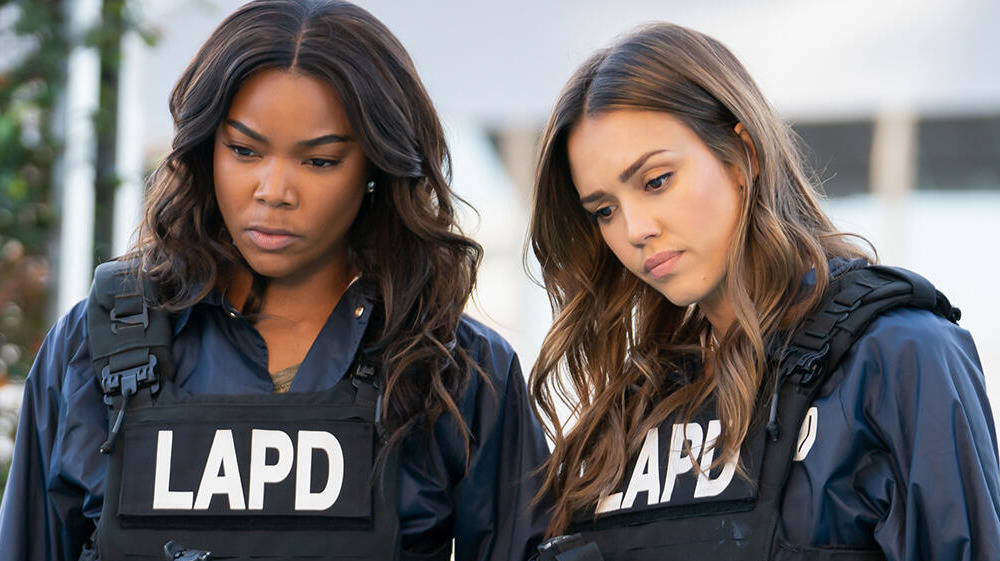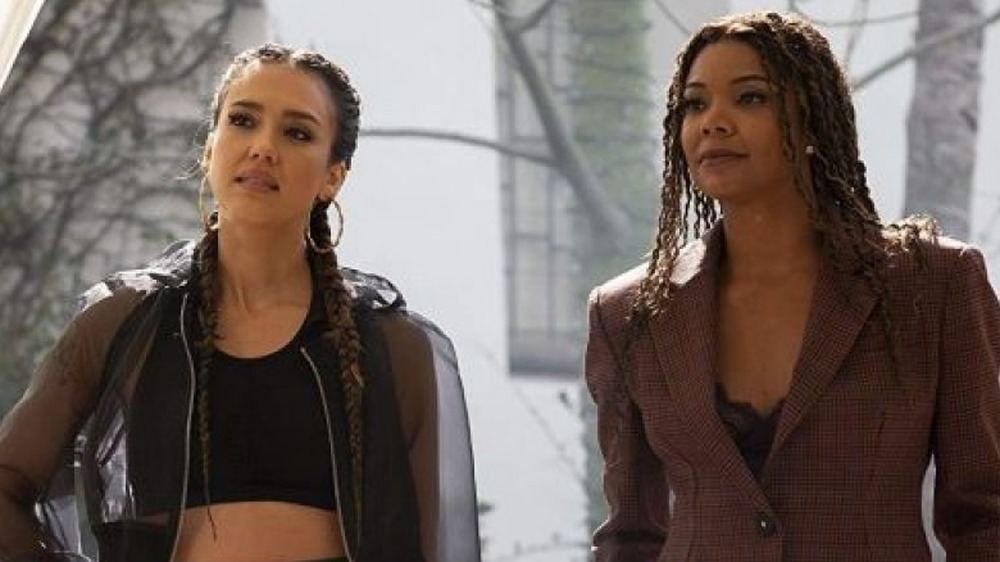Why Hollywood Won't Cast Jessica Alba Anymore
In the first years of the new millennium, Jessica Alba was absolutely everywhere — movies, television, and magazines. Hollywood seemingly couldn't get enough of the photogenic young actor who, after breakthrough through with the sci-fi TV show Dark Angel and the hit rom-com Never Been Kissed, fell into a string of roles as a screen siren in a variety of movies, such as the dance flick Honey, the neo-noir drama Sin City, the comedy The Love Guru, and two Fantastic Four movies, in which she played superhero Susan Storm. More roles in major movies followed, before Alba slowly started to seemingly disappear, showing up less in potential action blockbusters and big comedies, opting instead for little-seen horror movies and indie dramas. It's always a little perplexing when Hollywood proclaims a new future superstar... who then suddenly just seems to have fallen off the radar. Here's why Jessica Alba doesn't star in as many films as she once did.
The movie industry never knew what to do with Jessica Alba
Only within the past few years has Hollywood made a concerted effort toward casting diversity, both in representing many races and cultures on-screen and placing people of color in leading roles that would historically have gone to only white actors. Jessica Alba came up in the film industry in the late 1990s and early 2000s, when it could still be tough for anyone but the performers with the lightest skin tones to land big parts in big movies. Alba's lineage is partially European, and partially Mexican, and that left her ambiguous — and difficult to cast — in the eyes of filmmakers. "They couldn't figure out my ethnicity," Alba told PopSugar. "They were like, 'You're not Latin enough to play a Latina, and you're not Caucasian enough to play the leading lady, so you're going to be the 'exotic' one.' Whatever that was."
Jessica Alba was pigeonholed by Hollywood and the passage of time
Although Jessica Alba found it difficult for Hollywood to give her decent roles because casting directors were flummoxed by her racial background, the actor's opportunities were likely diminished due to others overly defining her, ironically enough. Alba is inexorably linked with a particular time and place in American pop culture. The film industry, and the media as a whole in the early-to-mid-2000s, foisted Jessica Alba on the public as a sex symbol — a fresh-faced ingénue in her early twenties who often starred as a scantily clad love interest or object of desire for male characters, an image bolstered by frequent appearances and mentions in men's magazines of the era, like Maxim. Alba is in her thirties now, and she's aged out of the roles that made her famous. Not only does Hollywood not really know what to do with her if they can't place her in the type of the role which they used to, but she's also firmly associated in millions of filmgoers' minds with the early 2000s.
Almost all of her big movies bombed
Hollywood is a town ruled by money, in that the actors who consistently pack movie theaters around the country with ticket-buying customers are the actors who get the best roles and the most roles. Jessica Alba was given a few shots at big-screen stardom in the 2000s and she didn't completely deliver on the hype and the promise. Only two movies in which she played a prominent, leading role — Fantastic Four and Fantastic Four: Rise of the Silver Surfer — made more than $100 million at the North American box office, an industry benchmark for financial success. Alba had smaller roles in big hits like Little Fockers and Valentine's Day, but those can't really be considered "Jessica Alba movies." Those projects that do fall under that umbrella title, however, include one mildly or moderately successful and largely forgettable movie after another. To name a few examples: The dance flick Honey took in $30 million in 2003, Good Luck Chuck brought in $35 million in 2007, Machete earned $26 million in 2010, and Escape from Planet Earth earned $57 million in 2013. After so many years of so-so films, movie producers just aren't willing to pony up millions to pay Alba if they aren't going to get a good return on their investment.
Her movies were savaged by critics
The Hollywood machine has two metrics by which it gauges actor success: box-office grosses and critical acclaim. Both are ideal, but if an actor can bring in a lot of money on movies that critics hate, or star in one prestigious, award-winning but low-grossing title after another, they're likely to enjoy a long career. Unfortunately for Jessica Alba, she was never a major commercial draw, and she's starred in lots of films that critics positively loathed. An Invisible Sign and Killers Anonymous are among the few movies to ever earn the rare 0 percent on Rotten Tomatoes, while Good Luck Chuck, Some Kind of Beautiful, The Love Guru, Idle Hands, and Meet Bill all failed to clear 20 percent, making them certified duds. Those films' lack of success may not be Alba's fault, but as the visible star of the film, she bears the brunt of the negative attention.
Some more negative attention that might make filmmakers not want to cast Alba: She's received a number of nominations for bad acting from the Razzie Awards, which single out the worst in film in any given year. She's been nominated for Worst Actress three times, Worst Screen Couple once, and actually took home the award for Worst Supporting Actress in 2011.
She allowed herself to drop off the A-list
Jessica Alba's workload has slowed, or at least shifted to smaller roles and smaller movies, but Hollywood gatekeepers' actions may not be the only impetus for that career change. One of the biggest reasons why Alba doesn't fill her life with wall-to-wall acting projects anymore is because she doesn't want that, and she made the conscious decision to pull back. "I really stopped acting when I was 27 full time," Alba told Access Hollywood (via The Daily Mail) in 2017, adding "if I did do a job it was really kind of a short period of time." However, she didn't want to shut the door on performance completely. "I'm open to diving back into acting. It's my passion and my heart," Alba told Working Mother. "I didn't take time off from acting completely, but I certainly didn't make it a focus." Ducking out of the Hollywood rat race to pursue other opportunities and life in general was a bold move for Alba, but it may have cost her career momentum, which could be difficult to re-acquire.
She's preoccupied — and getting very rich — as an entrepreneur
Jessica Alba has found more than a little satisfaction, financially, professionally, and personally, as the co-founder of the Honest Company. In 2008, her newborn daughter broke out in hives after wearing baby clothes washed in a leading detergent, so Alba set out to start a company that manufactured products free from potential toxins and allergens. She hired Healthy Child Healthy World author Christopher Gavigan as a consultant and LegalZoom founder Brian Lee to form Love & Honor, renamed the Honest Company at the time of the company's official launch in 2012. In its first year, Alba and associates sold $10 million worth of 17 products, primarily diapers and wipes, sold via mail order. By 2015, the Honest Company offered more than 130 products, including balms, toothpaste, detergent, and an offshoot beauty line. Available in more than 4,400 stores, Alba's company generated $150 million that year, right around the time it enjoyed a market valuation of $1.7 billion. Honestly, who has the time or inclination for the grueling process of landing movie roles and then filming them for months on end, when they're a hands-on leader and co-owner of a billion-dollar empire?
She was never much of a TV star
Jessica Alba is known primarily as an actor in feature films, but her first major starring role came in a network television series. In 2000, Alba headed up the cast of Dark Angel, a heavily hyped Fox science-fiction series co-created by Titanic and Terminator director James Cameron. Set in a cyberpunky, post-apocalyptic America, Alba played Max Guevera, also known as X5-452, a genetically-enhanced child who escaped from her facility and adopted a life as a young adult who motorcycles around the Pacific Northwest looking for other former lab kids and avoiding nefarious government agents. Dark Angel received good reviews, but it just couldn't attract much of an audience. In its first season, Dark Angel finished in 67th place among all network shows, and fell to 105th place in its second season. Fox canceled the show at that point, and Alba moved on, although touched with the impactful stigma of being the face of a high-profile small-screen flop. TV producers may still be reluctant to cast Alba as the sole lead of a show, on account of how her big chance with that situation led to middling results.
Her big TV comeback didn't work out
In 2019, Jessica Alba walked away from an acting career focused squarely on movies and took on her first leading role on a episodic television series since Dark Angel went dark in 2002. That show was L.A.'s Finest, a buddy cop show about two mismatched narcotics investigators. Alba portrayed by-the-book working mom Nancy McKenna and Gabrielle Union portrayed her loose cannon partner Sydney Burnett. They weren't exactly reinventing the wheel with the Lethal Weapon or Tango and Cash formula, plus L.A.'s Finest was linked to a popular film franchise, although nothing in its name would indicate that — it's a spinoff of the then-dormant Bad Boys franchise, in which Union played the sister of the character portrayed in the films by Martin Lawrence. Critical reviews were so-so — it scored 24 percent on Rotten Tomatoes — and audience figures were necessarily modest. That's because L.A.'s Finest debuted on Spectrum Originals, the proprietary streaming platform available only to Spectrum Cable customers. L.A.'s Finest didn't exactly put Spectrum Originals into Netflix or Hulu territory, and having a show on an obscure outlet certainly didn't do much for Alba's prospects.
Her big TV comeback bombed again, on a bigger stage
Despite the many hindrances to its success, L.A.'s Finest performed well enough that Spectrum Originals ordered a second season of the show. When the big broadcast networks found themselves with very little new scripted television because of months-long production shutdowns over COVID-19 concerns, they programmed their schedules with pre-existing, relatively little seen fare. For example, CBS promoted the CBS All Access series Star Trek: Discovery to network primetime, and Fox acquired the first season of L.A.'s Finest. Just after season two began airing on Spectrum Originals, older installments aired on Fox... and tanked. Despite the dearth of new content on offer, viewers still didn't want to tune in to watch new-to-them episodes of L.A.'s Finest. It attracted two million viewers on average, dismal ratings for a major network. If Jessica Alba is looking for a comeback, it's not going to be with L.A.'s Finest — Spectrum failed to order a third season of the police drama.
How Jessica Alba can turn it around
It seems like Jessica Alba has taken her career trajectory in stride, seeing as how she's been responsible in part for her move away from big-budget blockbusters and into lower-profile films and television. That's also a necessary step, as she's plenty busy (and financially secure) with her role atop the very successful Honest Company. She doesn't exactly need to be the toast of Hollywood, but if she were to reboot her career, she could continue on in the way she's been most successful in the 2010s and beyond: taking on supporting roles in ensemble movies. If she's one of a large cast of familiar faces, she can fully exploit the goodwill she's built up with audiences over the last 20 years. Alba's most financially well-received movies are the ones in which she isn't an above-the-title name, freeing her to simply act and ooze charisma. Some examples of this phenomenon: Little Fockers, the Entourage movie, and Valentine's Day. In other words, there's still a place in Hollywood for Jessica Alba.
